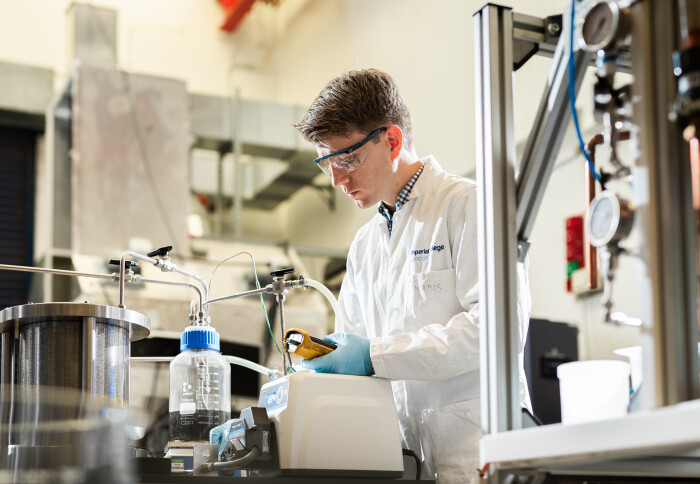New spinout to produce 2D materials sustainably

Spinout emanating from Chemical Engineering to tackle unsustainable production.
The next generation of advanced materials is becoming a reality thanks to the remarkable physico-chemical properties of graphene, boron nitride, molybdenum disulfide, and other 2-dimensional (2D) materials.
These materials can boost both the sustainability and financial performance of a wide range of industrial processes and commercial products. Their potential to reduce CO2 emissions and material waste by hundreds of millions of tonnes annually positions them as key contributors to global sustainability efforts.
2D Nano, an Imperial College London spinout led by Dr Andrius Patapas, Professor Omar Matar, Professor Camille Petit (Department of Chemical Engineering), and Dr Jason Stafford (Department of Mechanical Engineering, University of Birmingham), is pioneering the production of these advanced materials. The company leverages cutting-edge technology to address global sustainability challenges and align with government sustainability targets.
Professor Omar Matar, Head of Department, Chemical Engineering, states: “2D Nano combines our expertise in fundamental science and engineering know-how to manufacture the materials of tomorrow at scale.”
Moving forward with funding
Recently, 2D Nano secured £2 million in funding from private investors, allowing the company to scale up production of 2D materials to several tonnes per year. Their internal research and development suggests this can lead to the manufacturing of graphene-enhanced products in excess of 100,000 t/y. The company is particularly focused on deploying its materials in high-demand sectors such as concrete, coatings, and energy storage, where significant sustainability benefits can be realised. Early findings from graphene-enhanced products indicate improvements in key material properties by 10%-30% across various applications.
Dr Andrius Patapas, CEO of 2D Nano says: "We are very pleased to see the strong commitment from investors and key industry players in this rapidly evolving sector."
Advanced materials like graphene play a crucial role in achieving the goals outlined in both the economic and sustainability agendas. Dr Andrius Patapas CEO, 2D Nano
2D Nano's large-scale production process offers several key advantages:
- (Semi-) continuous and sustainable manufacturing
- Customisable 2D material products tailored to specifications
- Real-time quality monitoring (Industry 4.0 integration)
- Highly competitive production costs
By combining bespoke technologies with an experienced academic and industrial team, 2D Nano is well-positioned to meet growing industrial demand on a global scale. The company enables manufacturers to reduce costs, enhance sustainability, and integrate these materials seamlessly into their processes.
Professor Camille Petit, Director of Research, states: “It is really exciting to see our technology move up the TRL scale and for its potential technical and sustainability-related impact to be recognised by industry.”
What can 2D Nano offer?
Current commercial producers of 2D materials like graphene often encounter challenges such as:
- Unsustainable production processes
- Lack of real-time quality control
- Poor batch-to-batch consistency
- Limited material customization
2D Nano aims to solve these issues by offering a wide range of 2D material products, with guaranteed production at competitive rates, easy process integration, and real-time quality control. Their modular production technology is adaptable to meet demand across different regions and industries. By collaborating closely with industry partners, 2D Nano ensures that both businesses and society benefit from reduced costs, higher environmental standards, and enhanced product performance.
In the coming years, 2D Nano plans to expand its operations beyond the UK into Europe, the US, and the Middle East. By increasing production capacity to hundreds of tonnes per year, the company aims to make the advantages of 2D materials more widely accessible, driving significant sustainability and economic benefits across various industries.
ChemEng Enterprise-a rich history, an exciting present, a bright future
This is the latest outcome of the highly successful decentralised Enterprise support programme launched by the Department of Chemical Engineeering, unique within Imperial College London.
The scheme includes a pre-seed funding scheme, extensive advice and mentoring, support of interactions with Imperial and funders, and a yearly ChemEng Enterprise Day bringing together founders, early investors, mentors (alumni and professional) to network at the earliest possible stage.
Professor Sandro Macchietto, Director of Enterprise, said: "2D Nano is an excellent example of how successful research can be spun out in a fast-track mode, by planning and supporting the commercialisation journey from the beginning. Best wishes to Andrius and co-founders, they will go places!."
Find out more about ChemEng Enterprise.
Article text (excluding photos or graphics) © Imperial College London.
Photos and graphics subject to third party copyright used with permission or © Imperial College London.
Reporter
Navta Hussain
Department of Chemical Engineering